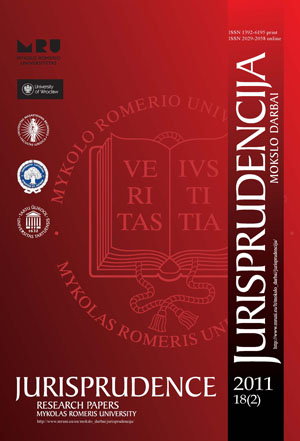Kai kurie kolektyvinio sutartinio darbo santykių teisinio reguliavimo skatinimo probleminiai aspektai
Some Problematic Aspects of the Promotion of the Regulation of Labour Relations by Means of Collective Agreements
Author(s): Rytis KrasauskasSubject(s): Law, Constitution, Jurisprudence
Published by: Mykolas Romeris University
Keywords: social partnership; collective agreement; labour relations; legal regulation; freedom of association
Summary/Abstract: The Lithuanian success of implementing international obligation in order to encourage the regulation of labour relations by means of collective agreements is analyzed in this article. It is emphasized that development of social partnership is too slow, coverage of regulation of labour relations by means of collective agreement also is low-level and collective agreements basically are made at the plant level. It is noticed that, because of the need to find a suitable balance between implementing the international obligation to encourage regulation of labour relations by means of collective agreements, and the necessity to undermine the raison d’être of the regulation by means of collective agreements itself, as the process, where attitudes of social partners has to be harmonised at maximum, the state has limited scope to influence the process of making collective agreements. In the author’s view, the regulation of labour relations, by means of collective agreements in Lithuania should be encouraged by increasing self-sufficiency of social partners (inter alia, by increasing qualifications of staff of social partners and social partners themselves, by increasing the social partner’s financial self-support, also by instituting tools to raise the social partner’s organizational capability), as well as by making preconditions to make real influence for labour relations regulating them by means of collective agreements (inter alia, by gradually reducing regulation of labour relations by means of normative legal acts, by coordination of the in favorem and in peius principles in collective labour law, by making preconditions to grant the erga omnes powers for collective agreements). This article proposes social partners to burnish their image while seeking for society support. In order to increase the guarantees of the active members of trade unions for their supplement risk, the author proposes to make amendments to Article 19 chapter 1 of Labour Code of the Republic of Lithuania. It is emphasized that the coordination of the in favorem and in peius principles in collective labour law ensures the protection of the rights of the employees while increasing the flexibility of labour law even when the employees are not represented by trade unions or work councils; also the opportunity of the effective administration of the corporate risks of the employees by means of collective agreements is given for those social partners who are active and socially responsible.
Journal: Jurisprudencija
- Issue Year: 18/2011
- Issue No: 2
- Page Range: 613-630
- Page Count: 18
- Language: Lithuanian

